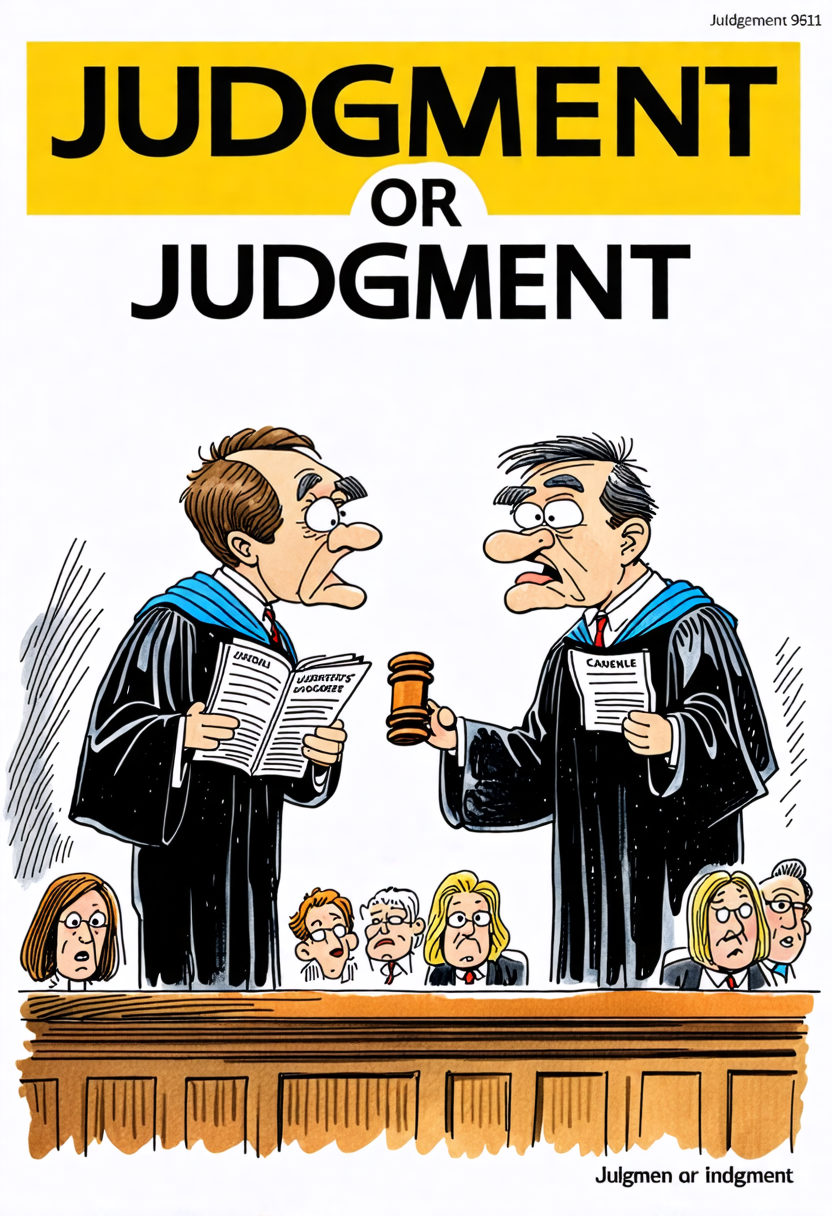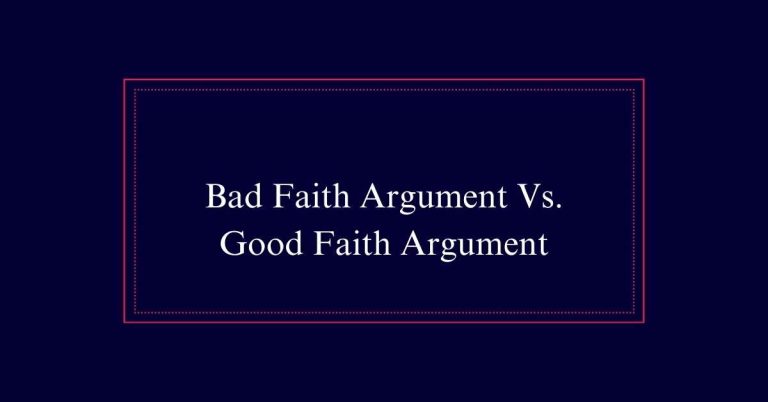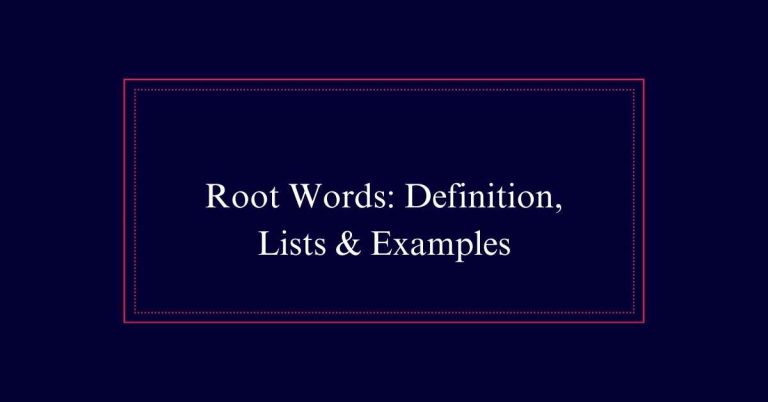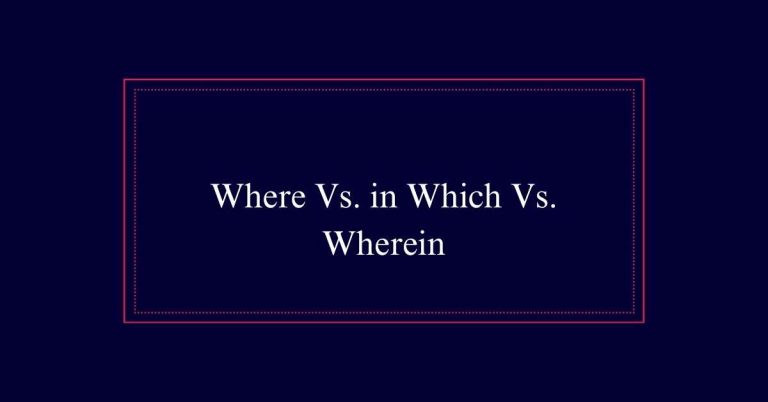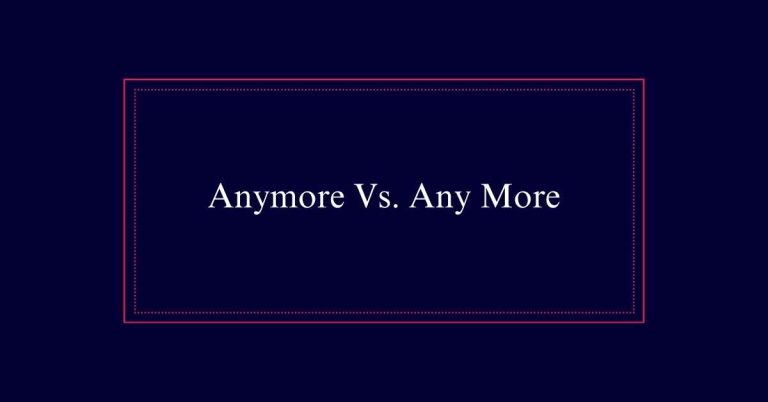Judgement or Judgment?
The correct spelling of the word depends on regional preferences. In British English, ‘judgement’ is commonly used, though ‘judgment’ is preferred in legal contexts. In American English, ‘judgment’ is overwhelmingly favored across all forms of writing.
Publications and legal documents in the U.S. consistently use ‘judgment.’ This trend has historical roots and is supported by various data sources, including Google Ngram Viewer.
British Vs. American Spelling
In the domain of British vs. American spelling, ‘judgement’ tends to be favored in British English, while ‘judgment’ is preferred in American English. This distinction is particularly evident in official and legal documents.
British legal proceedings often use ‘judgment,’ aligning with American practice. However, in general usage, British writers frequently opt for ‘judgement.’
In contrast, ‘judgment’ overwhelmingly dominates in American publications. This spelling preference extends to various types of documents, including books and articles.
Common Appearances in Print
Published works reveal distinct patterns in the usage of ‘judgment’ and ‘judgement.’ In American English, ‘judgment’ overwhelmingly prevails. This is evident in literature, legal documents, and other formal writings.
British English, however, shows a more balanced usage, though ‘judgment’ is still frequently seen, especially in legal contexts. Tools like Google Ngram Viewer highlight ‘judgment’ as more common in both American and British writings overall.
Examples in popular media and literature also reflect these trends. For instance, the official title of the video game ‘Gears of War: Judgment’ uses the American spelling.
Legal Proceedings in the UK
Legal proceedings in the UK often favor the spelling ‘judgment’ over ‘judgement.’ This preference is evident in official documents, court rulings, and legal texts. The spelling ‘judgment’ is considered the standard in British legal contexts, ensuring consistency and uniformity in documentation.
This choice aligns with the broader trend in British English, where ‘judgment’ is more commonly used than ‘judgement.’ While both spellings are technically correct, ‘judgment’ is preferred to avoid ambiguity.
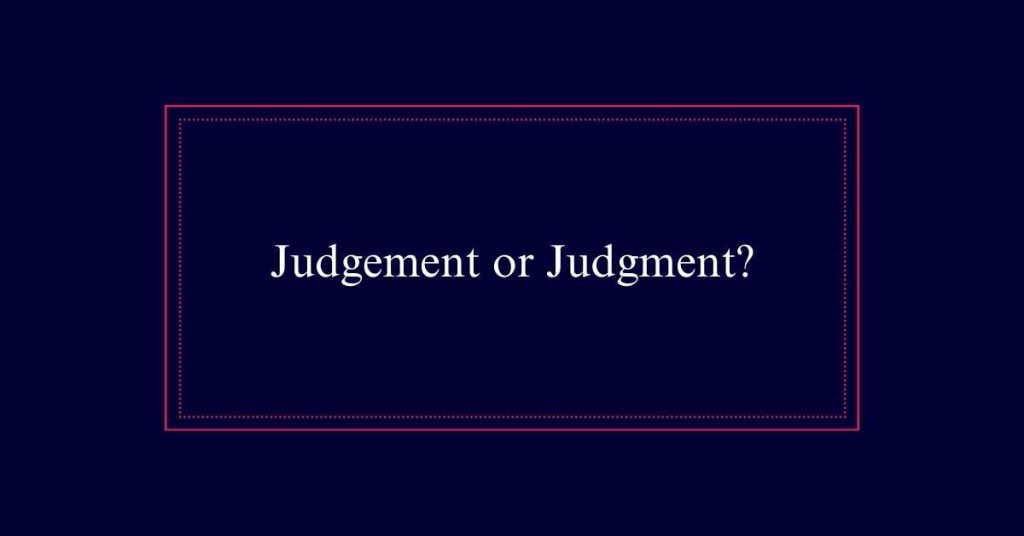
Legal professionals and courts maintain this practice to uphold clarity and precision in legal matters. In drafting legal documents or referring to court decisions in the UK, using ‘judgment’ is advisable to adhere to accepted conventions.
Gears of War Example
The preference for ‘judgment’ over ‘judgement’ extends beyond legal documents, as seen in the video game ‘Gears of War: Judgment.’ Released in 2013, this title uses the American spelling ‘judgment.’ This choice reflects broader trends in American English.
The game’s developers likely selected ‘judgment’ to align with its primary audience’s expectations, which is largely American. The use of ‘judgment’ in such a popular global franchise also underscores its dominance in modern American English.
This example highlights how contemporary media often favors ‘judgment.’ Therefore, even in contexts like video games, the simpler, American spelling is prevalent and widely accepted. This reinforces the trend towards ‘judgment’ in various forms of written content.
Google Ngram Viewer Data
Google Ngram Viewer data reveals that ‘judgment’ is much more common than ‘judgement’ in published books. This tool, which analyzes the frequency of words in millions of books, highlights a clear preference for ‘judgment’ over ‘judgement’.
The trend is consistent across different genres and time periods. Although both spellings are correct, ‘judgment’ dominates in both American and British contexts. This dominance is evident from a broad dataset, indicating a standardized usage in written English.
The data also indicates that ‘judgment’ is the preferred spelling in legal, academic, and professional texts. Therefore, for most published works, ‘judgment’ is the more widely accepted and recognized form.
Published Books Analysis
Examining the usage of ‘judgment’ and ‘judgement’ in published books further confirms the dominance of ‘judgment’ in both American and British contexts. Studies using tools like Google Ngram Viewer reveal that ‘judgment’ is consistently more prevalent. This trend is evident across a wide range of literary works and official publications.
British legal documents often use ‘judgment’, aligning with American practices. In fiction and non-fiction, ‘judgment’ still outweighs ‘judgement’. Although ‘judgement’ appears occasionally in British texts, it remains rare in American literature.
The data underlines that ‘judgment’ is the preferred spelling in most published materials, supporting its widespread acceptance in both linguistic traditions. This evidence helps writers choose the more commonly accepted form.
Samuel Johnson’s Dictionary
Despite the prevalence of ‘judgment’ today, Samuel Johnson’s dictionary in 1797 featured the spelling ‘judgement’. Johnson’s work was highly influential and shaped English language use for centuries. His choice of spelling aligned with British conventions of the time.
To visualize this historical context:
- Samuel Johnson’s Dictionary: A cornerstone of English lexicography.
- 1797 Publication: Marked a significant point in language standardization.
- British Spelling: Reflected the linguistic preferences of that era.
Johnson’s endorsement of ‘judgement’ contributed to its longstanding usage in British English.
While modern American English tends to favor ‘judgment’, Johnson’s dictionary remains a pivotal reference, illustrating the evolution and diversity of English spelling traditions.
Historical Usage Insights
Moving forward from Samuel Johnson’s influential dictionary, historical usage of ‘judgement’ and ‘judgment’ can be traced through various literary and official documents. Johnson’s choice of ‘judgement’ in 1797 set a precedent in British English. Over time, both spellings appeared in literature and legal texts.
In the UK, ‘judgement’ was commonly used in literature. However, in legal documents, ‘judgment’ became preferred. In the US, ‘judgment’ dominated, reflecting shifts in spelling conventions.
Publications like a May 2016 article and the BBC have used both forms, showing their interchangeable nature. Despite regional preferences, both versions carry historical significance and have been used by prominent sources. The choice between them often depends on context and audience.
Official Documents Preference
In official documents, the spelling ‘judgment’ is overwhelmingly preferred. This preference is evident in various types of formal writings, particularly in legal contexts. The choice of ‘judgment’ over ‘judgement’ is not only a matter of convention but also of clarity and uniformity in professional settings.
Legal documents: Courts and legal proceedings consistently use ‘judgment’.
Government reports: Official reports and reviews, such as annual wage reviews, favor ‘judgment’.
Corporate policies: Business and corporate documents adopt ‘judgment’ for consistency.
Using ‘judgment’ guarantees that documents are understood universally and maintain a standard across different fields.
Global Usage Considerations
When considering global usage, it is important to recognize that both ‘judgment’ and ‘judgement’ are accepted spellings, with the choice often influenced by regional preferences.
In the United States, ‘judgment’ is mainly used, including in legal contexts. Conversely, in the United Kingdom, ‘judgement’ is more common, though ‘judgment’ is also frequently seen in legal documents.
Internationally, ‘judgment’ tends to be more common, especially in formal and legal writings. The choice between the two spellings should take into account the audience and context.
For instance, using ‘judgment’ may be preferable in global or American contexts, whereas ‘judgement’ might be better suited for British audiences.
